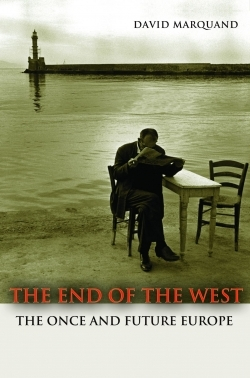The End of the West
The Once and Future Europe
The end David Marquand speaks of here is not a doomsday scenario in which the rising tide that is China and India washes away Europe and America. Rather, it is about the end of Western smugness and dominance—of the notion that the West is and has always been the beacon of civilization and democracy. That notion, always flawed under close inspection, has served, the author contends, as the prime rationale for political arrogance and military imperialism.
Although Marquand alludes to America throughout this treatise, his focus is on the European Union—what it set out to be, what it has developed into, and how the grand visions of the technocrats who run it differ from the more parochial interests of the citizens of the member nations. As a former member of Britain’s Parliament and official of the European Commission, Marquand brings considerable expertise to his analyses. Here’s how he summarizes the EU’s founding ideal: “In this union, the French would still be French, the Germans German, and the Italians Italian, but they would share a common European identity, reflecting common European values, a common European civilization, and a common commitment to the European project. Little by little, the shared, supranational European identity would come to trump the separate national identities… .”
But as the EU grew along its idealist lines—from the original six founding nations to the present twenty-seven—it became increasingly apparent that old habits, ethnic divisions, and differences in political history were undercutting the ideal of commonality. Moreover, there was a steady stream of immigrants from the East that had the effect of redefining what it meant to be “European,” if, indeed, that label ever meant anything specific. “Ancient cultural, political, and sometimes linguistic boundaries that the centralizing states of the modern era blotted out have come back into view, like rocks exposed by an ebbing tide,” Marquand observes.
As the EU extends its reach into ever more geographically remote and historically diverse territories, it dilutes its ability to act as a single unit and speak with a single voice. It is a perilous folly, the author concludes, for the EU to become “yet more diverse before first becoming more united.” Is there, he asks, a “Europe of the mind” as well as a Europe of design?
Reviewed by
Edward Morris
Disclosure: This article is not an endorsement, but a review. The publisher of this book provided free copies of the book to have their book reviewed by a professional reviewer. No fee was paid by the publisher for this review. Foreword Reviews only recommends books that we love. Foreword Magazine, Inc. is disclosing this in accordance with the Federal Trade Commission’s 16 CFR, Part 255.

